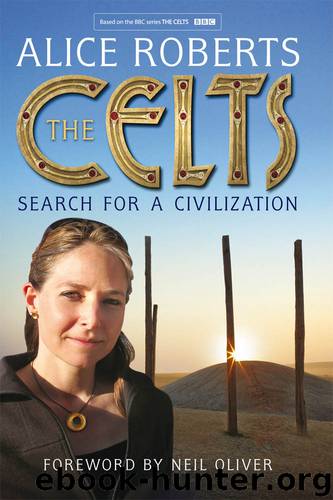Celts by Alice Roberts

Author:Alice Roberts
Language: eng
Format: azw3
ISBN: 9781784293321
Publisher: Quercus Publishing
Published: 2015-09-01T20:58:47+00:00
Gordion and the Galatians
In the first century BC, our old friend, Strabo, wrote:
There is also among [the Celts] the barbaric and highly unusual custom (practised most of all by the northern tribes) of hanging the heads of their enemies from the necks of their horses when departing from battle and nailing the spectacle to the doorways of their homes upon returning . . . The heads of those enemies that were held in high esteem they would embalm in cedar oil and display them to their guests.
The Greek historian Diodorus Siculus wrote a passage which is almost identical, and it’s thought that both Strabo and Diodorus are quoting the earlier Greek writer, Posidonius, who visited the south-east corner of Gaul in the early first century BC.
This description of headhunting is shocking to us today, and would have been no less shocking to civilized Greeks and Romans. In fact, there are plenty of passages in the works of classical scholars describing the warlike nature of the Celts, and several which specifically describe human sacrifice, including the killing of prisoners of war in order to honour the gods. Lucan described hanging as a particular mode of death carried out in order to propitiate the god Esus. He also wrote about a sacred grove, in southern Gaul, where ‘gods were worshipped . . . with savage rites, the altars were heaped hideous offerings and every tree was sprinkled with human gore’.
I visited Anatolia to meet with archaeologists at Gordion who had reportedly stumbled upon evidence of similarly horrific practices among the Galatians, the distant cousins of the Gauls whose practices were so graphically described by Posidonius and Lucan.
Gordion is famous for its mythical knot. In 333 BC, Alexander the Great was passing through Anatolia and stopped off at Gordion, promptly writing himself into legend by parting the Gordian knot. The knot seems to have signified kingship. In the palace at Gordion, an ox cart stood tied to a post with an extremely complicated knot. The ox cart itself was legendary; in ancient times, it had been the cart of a peasant who had driven it into the city, unaware that an oracle had decreed that this would make him the rightful king of Gordion. Alexander tried to untie the knot and failed, so he cut it with his sword. The meaning of this myth may be that, by severing the knot, Alexander ended the rule of the existing dynasty in Gordion, and thus became, himself, a legitimate ruler in Anatolia. The arrival of the Galatians in Anatolia, some sixty years later, was intrinsically linked to events following Alexander the Great’s death, as his generals carved up his empire among themselves.
Located on the Anatolian Plain, Gordion had been an important place since the beginning of the first millennium BC. It had been the capital of ancient Phrygia, and the home of the legendary King Midas, long before the Galatians arrived to settle there at the invitation of King Nichomedes of Bithynia, probably around 270 BC.
Download
This site does not store any files on its server. We only index and link to content provided by other sites. Please contact the content providers to delete copyright contents if any and email us, we'll remove relevant links or contents immediately.
| Africa | Americas |
| Arctic & Antarctica | Asia |
| Australia & Oceania | Europe |
| Middle East | Russia |
| United States | World |
| Ancient Civilizations | Military |
| Historical Study & Educational Resources |
Room 212 by Kate Stewart(5121)
The Crown by Robert Lacey(4817)
Endurance: Shackleton's Incredible Voyage by Alfred Lansing(4783)
The Iron Duke by The Iron Duke(4356)
The Rape of Nanking by Iris Chang(4213)
Joan of Arc by Mary Gordon(4110)
Killing England by Bill O'Reilly(4003)
Say Nothing by Patrick Radden Keefe(3986)
I'll Give You the Sun by Jandy Nelson(3447)
Shadow of Night by Deborah Harkness(3368)
Hitler's Monsters by Eric Kurlander(3343)
Mary, Queen of Scots, and the Murder of Lord Darnley by Alison Weir(3210)
Blood and Sand by Alex Von Tunzelmann(3205)
Eleanor & Park by Rainbow Rowell(3175)
Darkest Hour by Anthony McCarten(3133)
Margaret Thatcher: The Autobiography by Thatcher Margaret(3082)
Book of Life by Deborah Harkness(2939)
Red Famine: Stalin's War on Ukraine by Anne Applebaum(2934)
The One Memory of Flora Banks by Emily Barr(2863)
